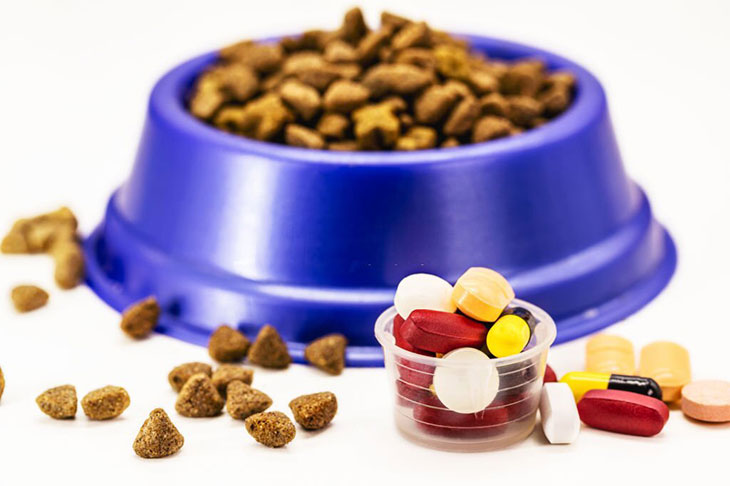Proper nutrition plays a vital role in maintaining the health and well-being of our beloved canine companions.
While dogs require certain essential vitamins for their overall growth and development, pet owners must know that not all vitamins are safe for dogs.
What vitamins are toxic to dogs? Understanding which vitamins can harm your furry friends is essential for ensuring their safety and preventing potential health complications.
Let’s explore the vitamins that can be toxic to dogs and their potential effects.
What Vitamins Are Toxic To Dogs?

Several organic compounds can be toxic to dogs if consumed in excessive amounts. The three main vitamins known to have toxic effects on dogs are vitamin D, A, and B6.
Vitamin D
Vitamin D can trigger vitamin poisoning in dogs because it is a fat-soluble element that can be stored in the body for long periods.
The primary role of vitamin D is to regulate calcium levels in the body.
While vitamin D is essential for maintaining calcium and phosphorus balance, excessive amounts can result in toxicity.
When my dog ingests too much vitamin D, it disrupts this balance, leading to hypercalcemia (elevated calcium levels).
This can harm various organs and systems within the dog’s body.
Vitamin A
Similarly, excessive intake of vitamin A can cause dog poisoning due to its fat-soluble nature and the body’s limited ability to eliminate excess amounts.
This vitamin is stored in the liver and fatty tissues of the body. When dogs consume too much vitamin A, the body cannot efficiently metabolize and eliminate the excess.
This promotes the accumulation of toxic vitamin A levels in the dog’s system over time.
Vitamin B6
Poisoning can step from overuse of vitamin B6, also known as pyridoxine.
Although vitamin B6 is essential for various bodily functions, an overdose can link to toxic effects. Here are the reasons why it can be harmful to dogs:
Vitamin B6 toxicity can affect the nervous system in dogs.
Over-consuming vitamin B6 can lead to the accumulation of certain compounds called pyridoxine metabolites, which can take a toll on nerve cells.
This can result in nerve damage and neurological symptoms.
What Is Vitamin Poisoning?
Vitamin poisoning in dogs, also known as hypervitaminosis, occurs when a dog ingests an excessive amount of vitamins, resulting in toxic levels within their body.
While vitamins are essential for dogs’ health and well-being, an overabundance of certain vitamins can have adverse effects and pose a risk to their overall health.
Symptoms may include gastrointestinal issues, loss of appetite, increased thirst and urination, weakness, and in severe cases, organ damage.
Causes Of Vitamin Poisoning In Dogs

Vitamin poisoning in dogs can appear due to several factors. Here are some common causes of vitamin poisoning in dogs:
- Accidental ingestion of human vitamin supplements:
Dogs may accidentally consume vitamin supplements intended for human consumption.
These products often contain higher concentrations of vitamins than are appropriate for dogs, leading to potential toxicity.
- Over-supplementation:
Some well-meaning pet owners may excessively supplement their dog’s diet. This can provoke an imbalance and accumulation of vitamins in the dog’s system.
- Unregulated or improperly formulated dog supplements:
Some dog supplements may not meet proper quality control standards or come with wrong dosages. Using such supplements can result in unintended vitamin toxicity in dogs.
- Ingestion of certain rodenticides:
Some rodenticides are packed with high vitamin D levels as an active ingredient. Dogs taking in these products or eating poisoned rodents can experience vitamin D toxicity.
- Maladministration of veterinary prescriptions:
Occasionally, errors in administering prescribed vitamin supplements by pet owners or miscommunication can also be the culprit of accidental overdose.
Symptoms Of Vitamin Poisoning In Dogs
The symptoms of vitamin poisoning in dogs can vary. It depends on the specific vitamin involved, the amount ingested, and the duration of exposure.
Here are some common signs that you might encounter:
- Gastrointestinal issues:
Vomiting and diarrhea can hint at vitamin poisoning in canines, similar to when your dog eats foxtail.
- Loss of appetite:
They may show disinterest in food, eat significantly less than usual or refuse to eat altogether.
- Increased thirst and urination:
Vitamin toxicity can affect the dog’s water balance. It increases thirst and frequent urination.
- Weight loss:
Unintentional weight loss can occur due to decreased appetite, gastrointestinal disturbances, and metabolic changes associated with vitamin poisoning.
- Weakness and lethargy:
Dogs with vitamin poisoning may display weakness, lack of energy, and excessive fatigue.
- Muscle tremors or seizures:
These neurological symptoms can originate from the excessive impact of certain vitamins on the central nervous system.
Treatment For Vitamin Poisoning In Dogs

The treatment for vitamin poisoning in dogs depends on the specific vitamin involved and the severity of the poisoning.
Some general treatment approaches that may be employed are:
- Inducing vomiting, like when your dog eats non-food objects like dove soap, stones, ect.
If the ingestion has occurred recently and the dog is stable, you may encourage vomiting to remove the ingested vitamins from the dog’s system.
This is typically done using medication or administering a hydrogen peroxide solution under veterinary supervision.
- Activated charcoal administration:
Activated charcoal will help your dog absorb and bind the vitamins in the gastrointestinal tract. It can prevent their further absorption into the bloodstream.
- Fluid therapy:
Intravenous (IV) fluid therapy may be suggested to maintain hydration and support the dog’s overall well-being. This helps flush out toxins from the body and restore electrolyte balance.
- Monitoring and observation:
The veterinarian will closely monitor the dog for any changes in their condition. They carry out blood tests to assess organ function and potential complications from vitamin toxicity.
- Specific antidotes or treatments:
Specific antidotes or treatments may be available for particular vitamin toxicities.
What Other Minerals Are Toxic To Dogs?
In addition to vitamins, several minerals can be toxic to dogs if ingested excessively. Here are some minerals that can be toxic to dogs:
Iron
Iron is also an essential mineral. Yet, overdosing on iron supplements or ingesting iron-containing products can harm your four-legged friend.
It is closely linked to gastrointestinal and potentially life-threatening organ damage.
Calcium
While calcium is an essential mineral for dogs, excessive calcium intake can trigger toxicity. This condition is known as hypercalcemia.
However, true calcium toxicity is relatively rare and is more commonly associated with underlying health issues or other factors.
Conclusion
What vitamins are toxic to dogs? Some vitamins can be harmful to dogs if consumed in excessive amounts, like Vitamin D, A, and B6.
Be cautious with vitamin supplementation for your furry friends.
You should seek veterinary guidance and ensure proper dosages to prevent vitamin toxicity and protect your companions’ health.
